Opposing Coaches Watch Out for Witcher : Success for Former Occidental Tennis Coach Is a Sure Bet at Division I Nevada Las Vegas : HEATHER HAFNER
- Share via
LAS VEGAS — Craig Witcher has a way of making opposing tennis coaches uneasy. At least those who want to keep their jobs.
In 1983, Witcher was the coach of the Division III Occidental College men’s tennis team. That season Occidental defeated Division II Cal State Northridge and the next season Witcher took over as the Northridge coach. In 1985, Witcher’s Northridge men’s team defeated Nevada Las Vegas, a Division I school. And in 1986 Witcher was at the helm of the men’s and women’s programs at Las Vegas.
“The year we beat UCLA that coach better watch out,” Witcher said in jest.
Witcher believes his success has been as much a product of timing as talent. It was a case of being in the right place at the right time and having accrued the necessary experience.
Witcher, 31, has played competitive tennis since his junior season at Marina High in Huntington Beach. He spent two seasons on the Golden West Junior College team where he played No. 2 as a freshman and No. 1 singles his sophomore year, earning a berth in the state tournament and a tennis scholarship to Northridge. He made an immediate impact at CSUN, playing No. 1 singles both seasons and twice winning the California Collegiate Athletic Assn. singles championship. Witcher followed his senior season with a summer of professional tennis in Europe.
But Witcher had designs on coaching and returned to Northridge, supplementing his degree in business administration with a degree in physical education. He started his career at Occidental in 1982 as the men’s coach and the women’s assistant. The men suffered through a disappointing season while the women won the Division III national title. The teams finished ranked 11th and third, respectively, in the Division III the next season and Witcher was bound for Northridge.
“I picked up a lot of needed experience at Occidental,” Witcher said. “Particularly, I learned about rankings and the politics of rankings. You have to fight for your teams and your players to get ranked. I learned that early.”
He had even more success at Northridge, leading his men’s team to 11th- and ninth-place national finishes in his two seasons. One of his main obstacles at Northridge was a lack of financial support. A problem that did not follow him to UNLV.
Here, Witcher has the support of the athletic administration as well as the community. He is able to travel to recruit players and benefits from his ties to Southern California tennis and a nationally prominent basketball program.
“We’re the only show in town,” Witcher said. “People are familiar with UNLV because they’ve heard of the basketball team. But they also know that we’re a powerhouse athletically and it’s not just our basketball program. Almost all of the teams have been ranked in the top 20 consistently throughout the years.”
So would Witcher just as soon take a recruit to a golf match as a basketball game? Hardly.
“It’s a great selling point,” Witcher said while surrounded by 18,000 screaming fans in the Thomas and Mack Center. “Especially when we get community support like this. We’re big time and the kids see that. They want to come here and they want to be a part of that.”
Witcher has tried to attract attention to the tennis program, annually playing host to a 16-team men’s tournament that is considered among the nation’s toughest. Both programs have steadily improved under his tutelage. The women finished 10-20 and 24-13 his first two seasons and are currently 9-9. The men’s team finished 14-19 and then 16-10, which left them tied for third in the Pacific Coast Athletic Assn. and equal to UNLV’s best conference finish.
Scott Warner, who won the PCAA singles title in 1986, won it again last season and became UNLV’s first tennis All-American when he advanced to the quarterfinals of the NCAA single’s tournament. Jolene Watanabe, a sophomore from La Puente, is UNLV’s first ranked player, currently No. 50 on the national list.
Anna Castaneda, a senior from Pacific Palisades, said that one of Witcher’s strengths is his ability to relate to the players.
“He knows how we all feel,” Castaneda said. “He understands because he’s been in the same position that we’ve been in.”
More to Read
Get our high school sports newsletter
Prep Rally is devoted to the SoCal high school sports experience, bringing you scores, stories and a behind-the-scenes look at what makes prep sports so popular.
You may occasionally receive promotional content from the Los Angeles Times.





